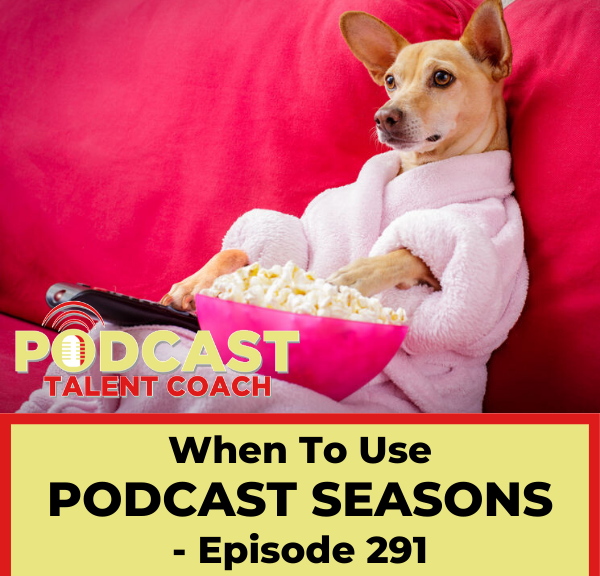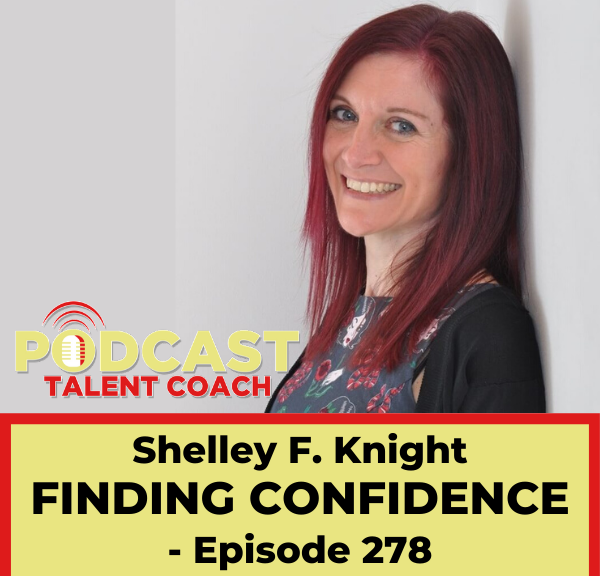Podcast: Play in new window | Download
Subscribe: RSS
We are answering your questions on the show this week. If you have a question, e-mail me at Coach@PodcastTalentCoach.com. I read all of those notes and answer as many as I can here on the show.
Today we will cover what goes in front of your show open, are seasons right for you and do you have the right niche.
WHERE TO PLACE THE ANNOUNCEMENT
When you have a special announcement that you want to get out to the audience, is it better to place that announcement at the very beginning of the podcast or play through the intro and then make the announcement followed by the episode? Sometimes those special announcements can feel like false starts and throws off the flow of the podcast.
– Greg
I agree, Greg. Sometimes that special announcement can feel like a false start.
This is a matter of preference and style. There really isn’t a right or wrong answer.
Think of the listener experience. When they show up and press play, they want to hear your show. How doesn’t the intro of your show add to that experience?
When you go to a movie, there are a few trailers prior to the start of the movie. After the trailers, here we go. Time to roll the credits and start the movie. It would feel odd if the movie started and then we rolled a trailer about 5 minutes into the movie. It is all about the experience.
On the other hand, think of Law and Order. In every episode of that police drama, it would open with the crime scene. You would see the detectives gather the details of the murder and then the opening would roll.
This tactic is all about hooking the audience early. You must be there right as the show begins to understand the plot. It is all about the audience experience.
Saturday Night Live does the same thing with their opening skit. Some shows air a little “previously on” in order to get the audience up to speed.
What do you want the audience experience? If the announcement is the most important piece of content you could share, maybe you want it right up front. If the outtake from the interview truly sets up the interview and piques the interest of the audience, maybe it goes up front.
Think of it this way … If a listener is brand new to your show and listening for the first time, would they understand the piece before your announcement? Usually, no. You haven’t build any know, like and trust yet.
“Hey, I’m doing a webinar next weekend – go sign up” doesn’t work if the listener has no idea who you are.
Saturday Night Live’s opening skit works, because you don’t need to see the intro to find it funny. The Law and Order open works, because you don’t need to see the intro to be sucked into the show.
Most of the time, you will be best served by playing the podcast intro, doing your own episode opening after that to set up this episode and then doing a little housekeeping.
WHEN TO USE PODCAST SEASONS
Some podcasts present their show in “seasons”. What are the pros and cons?
– Jon
If your content makes sense in seasons, then use that format. Most do not.
Podcasts about sports would make sense in seasons if they take the offseason off. However, podcasts about business typically do not make sense in seasons. Business typically doesn’t have a season.
There are some podcasts about business that take the month of December off or they don’t publish over the summer. That might make sense for seasons.
Seasons make sense for three instances.
– Your content is seasonal with a gap, like sports or education. The Glass and Out podcast is a show about coaching hockey. They take the summer off. This works perfectly for seasons.
– Your content has a storyline or theme that spans over 10 episodes, like true crime or chronological history. Serial is a good example of this. At the end of the investigation, the season ends.
– You create a few dozen episodes at one time that drip out over months. Book Tour podcast by John Grisham was recorded at each stop of his book tour. When the tour was over, the season was over. Broken Record with Malcolm Gladwell and Rick Rubin is recorded a few dozen at a time. They gather these together in a season. There is a gap between seasons.
If your content can be grouped together with a similar theme or common thread, and there is a natural gap, it makes sense to use seasons.
When your content is evergreen and listening out of order makes no difference, seasons probably are not for you.
FINDING CONTENT IDEAS
How do I create a format that lends itself to longevity making consistent content long-term? When creating a solo podcast, it is all dependent on the host to deliver something compelling that people want to keep coming back for. However, absent listeners sending questions, the interview model is the only one I can think of that won’t kill me trying to create content for it each week.
– Devin
You need to find the topic and niche that you can talk about for days. If you don’t have a niche that really fires you up, creating a show each week will feel like work. We don’t want that.
You can change your format anytime you’d like. It is your podcast. You make the rules.
I have done 291 episodes of this show. Over the years, I have interviewed maybe 6 people. I can’t remember exactly. Flexibility is my friend. I don’t like to be forced to record when my guest is ready.
However, I may start having guests on the show. I want to start talking to entrepreneurs who are using a podcast to grow their business. After 291 episodes, finding new ways to spin the topics becomes challenging. I will also be answering more of your questions. Just shoot them in.
That’s the great things about podcasting. If you don’t like it, change it.
There are various formats. Each take a little more work. A solo show is easiest and most flexible. On the other hand, it is all up to you to market the show.
The interview show is the most common. That format requires less show prep. You aren’t required to come up with all of the content. Your guests also help you promote the episodes.
There is also the magazine style show. This uses the host telling a story with various interviews dropped in to help draw the picture. This is like 48 Hours or 60 Minutes or The First 48. Interviews and clips are dropped in to tell the story.
The magazine format is highly engaging, but usually takes a team to pull off on a weekly basis.
Decide which format is right for you that you can produce on a regular basis.
To determine if you have the niche that is right for you, do a little brainstorming. See if you can come up with 50 different episode topics that interest you in 10 minutes.
If you can do that, you have the right niche. If that task is difficult, you are probably on the wrong path.
Check out Where To Find Podcast Content Ideas – Episode 289.
I would be happy to help you with defining your niche and show focus. Visit www.PodcastTalentCoach.com/coaching.
Do you need help with your podcast? E-mail me any time at Coach@PodcastTalentCoach.com. Let’s see what we can do.
Let’s turn your information into engaging entertainment.


